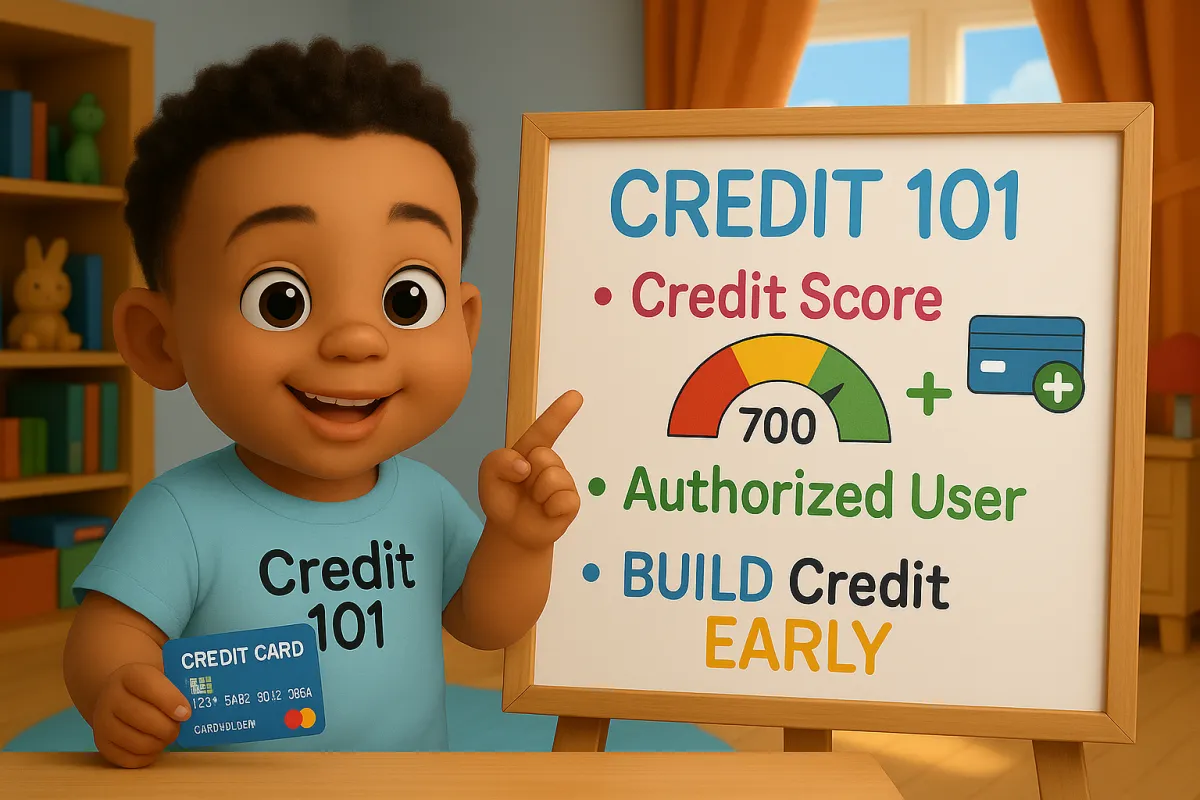Our Blog

Credit 101 For Children
Credit 101 For Children
Title: Credit 101: What Kids Should Know About Credit & How to Build a Good Score
What is credit? It’s like trust for money. When adults borrow money (using credit cards, loans, or similar), lenders want to know: will they pay back on time? That “will I be good at paying back?” is measured by a credit score. A strong credit score makes it easier to borrow in the future (for a car, a house), often with better interest.
Kids don’t usually borrow yet, but you can learn about credit early—and even start building a good credit score before you turn 18. Let’s see how.
What Is a Credit Score?
A number (often between about 300 to 850) that shows how responsible someone is at borrowing and paying back.
Higher is better. If your credit score is 700+ by the time you’re an adult, people will see you as responsible.
Here are things credit score looks at:
Paying bills on time
How much credit (cards, loans) you're using versus how much you could use (utilization)
How long accounts have been open
Types of credit (credit cards, installment loans, etc.)
New credit (opening many accounts at once can hurt)
How Kids or Teens Can Start Building Credit
Authorized User
An authorized user is when an adult (parent, guardian) adds you to their credit card account. You don’t need to apply or qualify.
The adult is fully responsible for paying the bills, but as long as they pay on time and keep balances low, being an authorized user can help your credit history.
Having Your Own Credit (if possible)
Some banks or credit card companies have no minimum age to be an authorized user; others might require you to be a teenager or 18 to open certain kinds of cards.
Once you're old enough, you might get a “starter” credit card or secured credit card (where you put down a deposit).
Banks & Age Limits
Policies vary: some banks allow children to be added as authorized users at any age; others require you to be 13, 15, or 18. It depends on the bank’s policy and the laws in your state.
It’s important to check with the bank or company to see what their rules are.
How To Get a 700+ Credit Score by Age 18 (If Done Well)
Here’s a plan:
Start early as an authorized user. Let the responsible adult maintain good behavior: pay on time, keep balance low.
Understand credit card bills: Know what “balance,” “interest,” “due date” mean.
Use credit sparingly: Don’t max out the card. Try to use maybe 10-30% of the available credit.
Pay on time, every time: Late payments hurt a lot.
Don’t apply for too many cards or loans while you’re a teenager: Each new account shows up on your credit report.
What Banks to Consider
Since banks vary, here are general steps:
Ask your bank or a local bank/credit union whether they allow authorized users at young ages.
If you’re old enough, see if there’s a student or teen credit card or a secured card.
Choose banks or credit cards with low fees and low minimums.
Why Good Credit Matters
Helps you get lower interest rates when you borrow (car, house).
Helps when applying for certain jobs or housing in some cases.
Means more trust from lenders.
Example
Imagine your parent adds you as an authorized user at age 13. They always pay the credit card bill on time, and they keep the balance low (say, 20% of the limit). Over the years, this good behavior gets reported to the credit bureaus. By the time you're 18, you have a history of 5 years of on-time payments and low utilization. You also open a small student credit card at 18 and continue the good habits. That puts you in a strong position: likely well above 700 credit score.
Final Thoughts
Credit is powerful: used well, it opens doors. Start learning early, use credit responsibly, and you can build a strong credit score by adulthood. It’s one of the “grown-up” tools that kids who learn early can win with.
Your Child’s Journey Begins Today – Let’s Grow Together!


We’re dedicated to teaching parents how to invest for their children. Thank you for trusting us to be part of your journey. Stay connected for updates, tips, and more!
Quick Links
Connect With Us
© Shiloh & Friends. 2026. All Rights Reserved.
Instagram
Youtube
TikTok